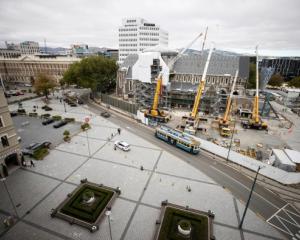
It does not always come from a position of malice, or meanness. Yet that it is how it feels — especially to the person, or place, at the centre of the mocking or sniping or humiliation.
Is that what we are seeing from non-Queenstown folk who are taking just a little bit of pleasure out of the struggles of the resort town?
Anecdotally, on social media, and through the pages of this newspaper and its sister papers in the regions, we are seeing a clear strain of anti-Queenstownism (it’s as good a word as any, right) emerge in the wake of the devastation wrought on the economy by the Covid-19 pandemic.
Witness the pages of our sister paper, Mountain Scene, which last week published some replies to a brutally honest column from Queenstown chef Darren Lovell, who said "this town is dying, and no-one, it seems, wants to talk about it. We need to talk about Queenstown. Everything is not OK."
The replies varied in vocabulary, but the tone was almost uniform.
"Obscene tourism is over. Get over yourself."
"Many ordinary Kiwis were shut out of your operations because they were unaffordable, so I’m sorry, but don’t come crying to us now."
"You made things so damn expensive chasing the tourist money we were left out in the cold."
The "be kind" mantra that has helped New Zealand battle through a ghastly year appears to run out by the time it reaches Frankton.
And why is that? Why do so many appear to be so unfussed by the carnage Covid has caused in Queenstown, where the collapse of international tourism has left people out of work, or stranded, and businesses on their knees?
To an extent, we get it. Queenstown has been the golden child for so long, the bright and booming star in the New Zealand tourism industry that made the most noise and splashed the most cash.
It was bold, and it bragged, and it nakedly chased as many tourism dollars as it could possibly get. And some didn’t like that, especially if they were from a more "ordinary" part of the country that remained in the shadows.
Did Queenstown "ignore the common Kiwi" and now must pay the price? It is hard to say what that even means.
What needs to be remembered is that Queenstown has formed a massive part of the South’s economy for a long time. It has provided jobs, business opportunities, growth beyond the realms of its forefathers’ imagination.
Crucially, a booming Queenstown has been great for the rest of the South. As council economic development manager Peter Harris wrote in this newspaper recently, the only international mountain resort in Australasia has acted as a gateway to the rest of the island.
All New Zealanders should care, Mr Harris wrote, about the welfare of Queenstown because when it goes well, we go well.
His further argument, that Queenstown is perfectly placed to be not just a tourism mecca but a centre of innovation, a "testing ground", is also worth noting.
Laughing at Queenstown is not an option. Nor is leaving it behind as the rebuild from Covid-19 begins.
The South is stronger together. We should all care about all corners of the region.
AND ANOTHER THING
Surely, it is time for the puerile and potentially dangerous promotion known as "Crate Day" to be consigned to the pages of history.
The annual event, started by a radio station as a stunt and warmly embraced by the liquor industry, is nothing more than a lame excuse for (mostly) young men to get smashed.
This country has had a long problem with binge drinking. A nonsense "celebration" like this leads to spikes in violence and hospital admissions, and situations like that at the weekend when a 9-year-old boy was caught driving his drunk father to a Mosgiel bottle store.
Put a cap on Crate Day and grow up.













